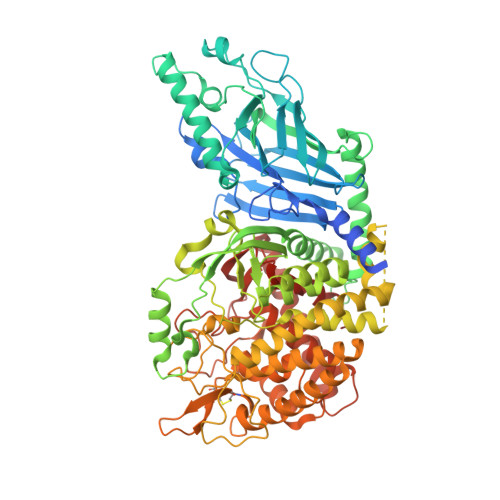Identification of Endoplasmic Reticulum alpha-Glucosidase I from a Thermophilic Fungus as a Platform for Structure-Guided Antiviral Drug Design.
Karade, S.S., Kolesnikov, A., Treston, A.M., Mariuzza, R.A.(2022) Biochemistry 61: 822-832
- PubMed: 35476408
- DOI: https://doi.org/10.1021/acs.biochem.2c00092
- Primary Citation of Related Structures:
7T66, 7T68, 7T6W, 7T8V - PubMed Abstract:
All viruses depend on host cell proteins for replication. Denying viruses' access to the function of critical host proteins can result in antiviral activity against multiple virus families. In particular, small-molecule drug candidates which inhibit the ¦Á-glucosidase enzymes of the endoplasmic reticulum (ER) translation quality control (QC) pathway have demonstrated broad-spectrum antiviral activities and low risk for development of viral resistance. However, antiviral drug discovery focused on the ERQC enzyme ¦Á-glucosidase I (¦Á-GluI) has been hampered by difficulties in obtaining crystal structures of complexes with inhibitors. We report here the identification of an orthologous enzyme from a thermophilic fungus, Chaetomium thermophilum ( Ct ), as a robust surrogate for mammalian ER ¦Á-GluI and a platform for inhibitor design. Previously annotated only as a hypothetical protein, the Ct protein was validated as a bona fide ¦Á-glucosidase by comparing its crystal structure to that of mammalian ¦Á-GluI, by demonstrating enzymatic activity on the unusual ¦Á-d-Glc p -(1 ¡ú 2)-¦Á-d-Glc p -(1 ¡ú 3) substrate glycan, and by showing that well-known inhibitors of mammalian ¦Á-GluI (1-DNJ, UV-4, UV-5) also inhibit Ct ¦Á-GluI. Crystal structures of Ct ¦Á-GluI in complex with three such inhibitors (UV-4, UV-5, EB-0159) revealed extensive interactions with all four enzyme subsites and provided insights into the catalytic mechanism. Identification of ER Ct ¦Á-GluI as a surrogate for mammalian ¦Á-GluI will accelerate the structure-guided discovery of broad-spectrum antivirals. This study also highlights Ct as a source of thermostable eukaryotic proteins, such as ER ¦Á-Glu I, that lack orthologs in bacterial or archaeal thermophiles.
Organizational Affiliation:
Institute for Bioscience and Biotechnology Research, University of Maryland, Rockville, Maryland 20850, United States.





















